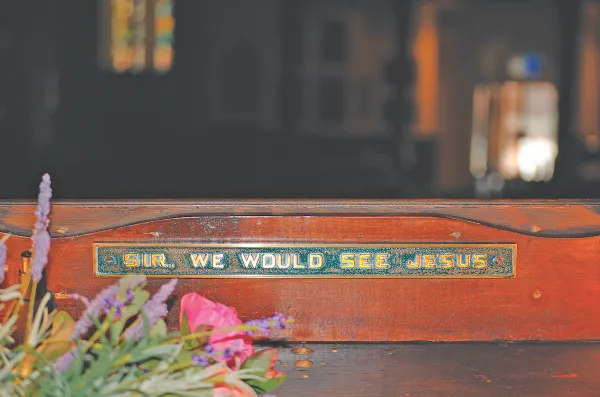If This is What we Call Ecumenism, We're in Trouble.

John MacArthur's memorial service has come and gone. And some people want us to think there's a profound lesson on ecumenicalism for us to learn, by the presence and participation of Alistair Begg and John Piper in that service.
Before I get too much further. I realize a few things:
I realize this post is a bit "niche" as they say. It’s very “in-house” — not everyone will care or benefit from it. I get that. But I just can't not say something about this.
And before anyone thinks I'm suffering from delusions of grandeur, I fully realize I’m just a guy pastoring in the Pacific Northwest, watching from the cheap seats. Who am I to comment on titans like John MacArthur, John Piper, or Alistair Begg? Nobody, really. It's not like I’m a published author or a seminary president.
I’ve known people who personally knew John MacArthur, but I never met the man myself. I once shook hands with John Piper at a conference when I asked him to sign a book. I’ve had the chance to meet Alistair Begg a handful of times, even to share a meal and a brief conversation — but he wouldn’t know me from Adam.
So no, I’m not connected to these men in any meaningful way, other than as one of the countless pastors who has benefited from their books and sermons, watching them from a distance.
But I have been watching.
And what I’ve seen over the years — especially in the wake of MacArthur’s passing — has made me reflect deeply on his legacy.
When John MacArthur passed away, my social media feed filled with eulogies in universal praise. And I had some... other thoughts — plenty of them. But it felt too soon, too inappropriate, to say anything. So I said nothing. Until I stumbled across a video yesterday about Alistair Begg praying at MacArthur’s memorial service — and then saw that video promoted on Tim Challies’ blog this morning.
Suddenly, the questions I’d shelved came rushing back.
MacArthur’s Legacy: Good and Hard
Let me be clear. John MacArthur did immense good for the Church. He modeled long-term, faithful expository preaching in an era when fewer and fewer churches seemed interested in it. He stood courageously on biblical authority when culture — and even much of evangelicalism — was tilting. He trained and influenced a generation of pastors, myself included.
I mean every word when I say this: Church History books moving forward ought to include John MacArthur's life and ministry.
But.
I can’t shake the sense, and the grief, that his legacy will be... shaded... by how over the last decade or so he had become increasingly insistent on something else: division. Drawing sharp lines. Fostering suspicion. Creating camps.
In his later years, it felt like for every "A-Men!" I uttered, I was coming back moments later with a groan thinking, "Oh come on Dr. MacArthur... You know that's too far."
And my deeper concern, while MacArthur would always be MacArthur, is that in the meantime, he is influencing thousands... tens of thousands of pastors, who will lack his maturity, wisdom, and experience, and go further yet.
Case in point...
The Video
As I surfed YouTube yesterday, a thumbnail caught my eye:
"You WON'T Believe Who Spoke at John MacArthur's Memorial Service"
Click-bait, clearly. But it worked. My interest was piqued. I clicked in, expecting to find someone at least slightly controversial. The video title merited someone at least as different from MacArthur as say, Rick Warren.
Instead, Todd Friel comes on and reveals that (* SHOCK *) Alistair Begg had been invited to pray at the service.
Alistair Begg’s presence, which truly should have been seen as an obvious inclusion, was framed by Friel as if it were some extraordinary exercise in ecumenical courage.
He described it as “something extraordinary” that should give us pause — then asked,“What was Alistair Begg doing at the John MacArthur Memorial?” Later, the same question was asked about John Piper: “What in the world was John Piper doing at the memorial?”
The implication was clear: their involvement was surprising, even controversial. As if we had just witnessed a bold experiment in unity across deep cavernous divides. Friel spoke of this “ecumenism” — loving other Christians despite our disagreements — as if this was MacArthur’s final gift to the church.
But the framing itself was telling. Alistair Begg led a prayer. John Piper gave a eulogy. Both men were long-time friends of MacArthur. Their inclusion should not have been surprising in the least. And yet, the way the video presented it, their participation was almost scandalous — as though inviting them into the service required some monumental act of grace.
If you haven't been following these men and their ministries, let me try to put it this way...
Shades of Blue
Maybe we can think of it in terms of color. If MacArthur’s doctrinal shade was a deep navy blue, Piper might be cobalt, and Begg perhaps a royal blue. They’re all blue — same family, same spectrum. The differences are real enough if you’re squinting at paint chips side by side under fluorescent light, but to the naked eye they clearly belong together.
And yet, the way Todd Friel described Begg’s presence — as though it were an act of astonishing ecumenical grace — you’d think he had shown up in neon orange. As if Begg and Piper were from a totally different palette of the Church altogether, when in reality they’re simply different shades of the same hue.
If you want to talk about truly different colors, then yes — that’s when you start talking about ecumenism. If you've brought in those who approach ministry with a whole different set of convictions: the reds, the yellows, maybe even the purples. But Begg and Piper? They’ve always been blue.
Yes, yes. Of course, I realize there was controversy not long ago when Alistair Begg advised a grandmother to attend her grandchild’s wedding to a transgender individual — counsel that John MacArthur and many others found abhorrent. That disagreement was real. But to frame Begg’s presence at the memorial as shocking on that basis still feels grossly disproportionate.
Let's be clear. The difference between Begg and MacArthur there was not doctrinal. They would write the same position paper, citing the same Scriptures, on what marriage is, on what a man is, on what a woman is. On what sex is for. They see it the same. They would agree on what is the truth.
Begg gave a grandma different advice on how to navigate that truth than MacArthur would have given. So now we're supposed to act like their division was so sharp, that despite being long time friends, it's a shock to see Begg (* GASP *) praying at MacArthur's memorial service?
Bill - Don't you believe that doctrine matters?
Yes. Yes I do. In fact, just a few weeks ago I posted an article about preaching the Gospel at a multi-church cross-denominational event at our county fair. Hardly the same size platform as any of the men mentioned in this article, I realize. But in that post I indeed reflected on how our denominational distinctives matter more in practice than we might realize.
On paper "working together" sounds nice and wonderful. But the further you get into it, the quicker you realize, oh wait - I guess denominations exist for a reason. If we can keep the Gospel of Jesus Christ front and center, I argued, then working together despite our very real and very meaningful differences, is possible.
But that's hardly what's in view here.
It's not like Begg was going to get up there and start speaking in tongues (you're welcome for that mental picture). Nor is it as if Piper was going to stand there and start arguing for infant baptism.
Doctrine matters. It matters deeply. But let’s keep perspective: what happened at MacArthur’s memorial wasn’t some test case in cross-denominational cooperation. It was a funeral. A place to pray, to grieve, to honor a brother in Christ.
That’s what makes the shock over Begg’s prayer or Piper’s eulogy feel so disproportionate. These weren’t exercises in theological compromise. They were simple, fitting acts of friendship. If we can’t even handle that without calling it “ecumenism,” then maybe the problem isn’t with Begg or Piper — maybe it’s with the way some of us have learned to police the lines.
After seeing Todd Friel's video, I might have stopped and thought, oh this is just one guy, trying to get views for his YouTube channel. But then this morning, as I mentioned, Tim Challies used his rather large platform to point his readers to the same video, which I have to infer means his endorsement of it.
So I continue to have a growing concern on how (especially the Calvinists among us) seem hell-bent on fighting over doctrine.
A Pastoral Call
We can hold doctrinal convictions without turning every distinction into a test of fellowship. Unity doesn’t mean squishiness, or pretending doctrine doesn’t matter. It means distinguishing between essentials and secondaries, between the gospel itself and the shades of blue around it.
And that’s what makes the reaction to MacArthur’s memorial so revealing. The fact that Alistair Begg’s prayer or John Piper’s eulogy could be framed as an act of daring ecumenicalism shows just how tightly we’ve drawn the lines — and just how divided we’ve become. If honoring a friend can only be explained as ‘overlooking differences,’ then perhaps we’ve so redefined fellowship that we can’t even see unity when it’s standing before us.
If men as close in doctrine to MacArthur as Begg and Piper are seen as outsiders — to the degree that their presence is considered a shocking act of ecumenicalism — perhaps we need to awaken to how badly we’ve confused shades of the same color for entirely different colors, and how much weight we’ve placed on theological minutiae. And if that’s the case, then what happened at Dr. MacArthur’s service is not an occasion for pride, but an occasion for grief.
PS. Here's a clip of Alistair Begg that EVERY person should see.



